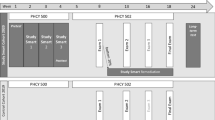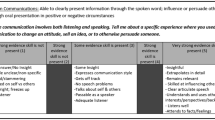Abstract
Introduction
Medical schools are shifting to a holistic approach for admissions. As non-cognitive abilities become more valued in the medical field and admissions become more competitive, multiple mini-interviews (MMI) are becoming increasingly common in selection criteria. The purpose of this article is to examine the relationship among admissions criteria to create a predictive model of acceptance to medical school. This article also aims to examine, among matriculated students, the relationship between MMI and traditional academic success, and the relationship between MMI scores and clinical competence and academic accolades.
Methods
This longitudinal study followed a cohort of students from the MMI process through the first two pre-clinical years at a medical school in the southeastern USA. Multiple logistic regression with backward elimination variable selection was used to examine the relationship between admission criteria and acceptance. A multivariate multinomial ordered probit model was used to assess the relationship between MMI and traditional academic success among matriculated students. Simple linear regression models were used to assess relationships between MMI and Objective Structured Clinical Examination (OSCE) scores and honors nomination.
Results
MMI are among eight significant predictors of acceptance. Among matriculated students, there were weak negative associations between MMI and traditional academic success; however, all but one relationship was statistically non-significant. There was not a significant association between MMI and OSCE scores or academic accolades.
Conclusions
While MMI can identify students with non-cognitive skills needed to be a good physician, continued assessment needs to be incorporated in their education.



Similar content being viewed by others
References
Association of American Medical Colleges. Graduation rates and attrition rates of U.S. medical students. 2018. Available from: https://www.aamc.org/download/492842/data/graduationratesandattritionratesofu.s.medicalstudents.pdf
Eva KW, Rosenfeld J, Reiter HI, Norman GR. An admissions OSCE: the multiple mini-interview. Med Educ. 2004;38(3):314–26.
Thompson L. Medical schools using multiple mini interviews (MMI). Thompson Advising. 2018.
Witzburg RA, Sondheimer HM. Holistic review - shaping the medical profession one applicant at a time. N Engl J Med. 2013;368:1565–7.
Patterson F, Knight A, Dowell J, Nicholson S, Cousans F, Cleland J. How effective are selection methods in medical education? A systematic review. Med Educ. 2016;50(1):36–60.
Ha JF, Longnecker N. Doctor-patient communication: a review. Ochsner J. 2010;10(1):38–43. Available from: http://www.ncbi.nlm.nih.gov/pubmed/21603354. http://www.pubmedcentral.nih.gov/articlerender.fcgi?artid=PMC3096184.
Di Blasi Z, Harkness E, Ernst E, Georgiou A, Kleijnen J. Influence of context effects on health outcomes: a systematic review. Lancet. 2001;357(9258):757–62.
Lemay JF, Lockyer JM, Collin VT, Brownell AKW. Assessment of non-cognitive traits through the admissions multiple mini-interview. Med Educ. 2007;41(6):573–9.
Zaidi NB, Swoboda C, Wang LL, Manuel RS. Variance in attributes assessed by the multiple mini-interview. Med Teach. 2014;36(9):794–8.
Jerant A, Fancher T, Fenton JJ, Fiscella K, Sousa F, Franks P, et al. How medical school applicant race, ethnicity, and socioeconomic status relate to multiple mini-interview-based admissions outcomes: findings from one medical school. Acad Med. 2015;90(12):1667–74.
Hadad A, Gafni N, Moshinsky A, Turvall E, Ziv A, Israeli A. The multiple mini-interviews as a predictor of peer evaluations during clinical training in medical school. Med Teach. 2016;38(11):1172–9.
Pau A, Chen YS, Lee VKM, Sow CF, De Alwis R. What does the multiple mini interview have to offer over the panel interview? Med Educ Online. 2016;21(1).
Leduc JM, Rioux R, Gagnon R, Bourdy C, Dennis A. Impact of sociodemographic characteristics of applicants in multiple mini-interviews. Med Teach. 2017;39(3):285–94.
Al Abri R, Mathew J, Jeyaseelan L. Multiple mini-interview consistency and satisfactoriness for residency program recruitment: Oman evidence. Oman Med J. 2019;34(3):218–23.
Sebok SS, Luu K, Klinger DA. Psychometric properties of the multiple mini-interview used for medical admissions: findings from generalizability and Rasch analyses. Adv Health Sci Educ. 2014;19(1):71–84.
Knorr M, Hissbach J. Multiple mini-interviews: same concept, different approaches. Med Educ. 2014;48(12):1157–75.
Jerant A, Henderson MC, Griffin E, Rainwater JA, Hall TR, Kelly CJ, et al. Reliability of multiple mini-interviews and traditional interviews within and between institutions : a study of five California medical schools. 2017;1–6.
Trost G, Nauels H, Klieme E. The relationship between different criteria for admission to medical school and student success. Assess Educ Princ Policy Pract. 2007;5(2):247–54.
Prideaux D, Roberts C, Eva K, Centeno A, McCrorie P, McManus C, et al. Assessment for selection for the health care professions and speciality training: consensus statement and recommendations from the Ottawa 2010 Conference. Med Teach. 2011;33(3):215–23.
Wilkinson D, Zhang J, Byrne G, Luke H, Ozolins I, Parker M, et al. Medical school selection criteria and the prediction of academic performance. Med J Aust. 2008;188(6):349–54.
Benbassat J, Baumal R. Uncertainties in the selection of applicants for medical school. Adv Health Sci Educ. 2007;12(4):509–21.
Basco WJ, Lancaster C, Carey M, Gilbert G, Blue A. The medical school applicant interview predicts performance on a fourth-year clinical practice examination. J Pediatr Res. 2004;55(4):350.
Basco WJ, Lancaster C, Gilbert G, Carey M, Blue A. Medical school application interview score has limited predictive validity for performance on a fourth year clinical practice examination. Adv Health Sci Educ. 2008;13:151–62.
Fan A, Tsai T, Su T, Kosik R, Morisky D, Chen C, et al. A longitudinal study of the impact of interviews on medical school admissions in Taiwan. Eval Health Prof. 2010;33:140–63.
Kreiter CD, Yin P, Solow C, Brennan RL. Investigating the reliability of the medical school admissions interview. Adv Health Sci Educ. 2004;9(2):147–59.
Cook CJ, Cook CE, Hilton TN. Does emotional intelligence influence success during medical school admissions and program matriculation?: a systematic review. J Educ Eval Health Prof. 2016;13:40.
Sladek RM, Bond MJ, Frost LK, Prior KN. Predicting success in medical school: a longitudinal study of common Australian student selection tools. BMC Med Educ. 2016;16(1):1–7. https://doi.org/10.1186/s12909-016-0692-3.
Dyrbye L, Harper W, Moutier C, Durning S, Power D, Massie F, et al. A multi-institutional study exploring the impact of positive mental health on medical students’ professionalism in an era of high burnout. Acad Med. 2012;87(8):1024–31.
Hojat M, Vergare M, Isenberg G, Cohen M, Spandorfer J. Underlying construct of empathy, optimism, and burnout in medical students. Int J Med Educ. 2015;6:12–6.
Ross M, Walker I, Cooke L, Raman M, Ravani P, Coderre S, et al. Are female applicants rated higher than males on the multiple mini-interview? Findings from the University of Calgary. Acad Med. 2017;92(6):841–6.
Cowart K, Dell K, Rodriguez-Snapp N, Petrelli HMW. An examination of correlations between MMI scores and pharmacy school GPA. Am J Pharm Educ. 2016;80(6):1–5 Available from: https://search.proquest.com/docview/1826192448?accountid=188397.
Libbrecht N, Lievens F, Carette B, Côté S. Emotional intelligence predicts success in medical school. Emotion. 2014;14(1):64–73.
Oluwasanjo A, Wasser T, Alweis R. Correlation between MMI performance and OSCE performance – a pilot study. J Community Hosp Intern Med Perspect. 2015;5(3):27808.
Terregino CA, McConnell M, Reiter HI. The effect of differential weighting of academics, experiences, and competencies measured by multiple mini interview (MMI) on race and ethnicity of cohorts accepted to one medical school. Acad Med. 2015;90(12):1651–7 Available from: http://content.wkhealth.com/linkback/openurl?sid=WKPTLP:landingpage&an=00001888-201512000-00027.
Henderson MC, Kelly CJ, Griffin E, Hall TR, Jerant A, Peterson EM, et al. Medical school applicant characteristics associated with performance in multiple mini-interviews versus traditional interviews. Acad Med. 2018;93(7):1029–34 Available from: http://journals.lww.com/00001888-201807000-00026.
Author information
Authors and Affiliations
Corresponding author
Ethics declarations
Conflict of Interest
The authors declare that they have no conflict of interest.
Ethical Approval
This study was approved by the Institutional Review Board at the University of South Carolina (Pro 00069266).
Informed Consent
As a secondary data analysis with de-identified data, informed consent was not needed per university policy.
Additional information
Publisher’s Note
Springer Nature remains neutral with regard to jurisdictional claims in published maps and institutional affiliations.
Electronic Supplementary Material
ESM 1
(XLSX 175 kb)
Rights and permissions
About this article
Cite this article
Kennedy, A.B., Riyad, C.N.Y., Gunn, L.H. et al. More Than Their Test Scores: Redefining Success with Multiple Mini-Interviews. Med.Sci.Educ. 30, 1049–1060 (2020). https://doi.org/10.1007/s40670-020-01013-z
Published:
Issue Date:
DOI: https://doi.org/10.1007/s40670-020-01013-z




